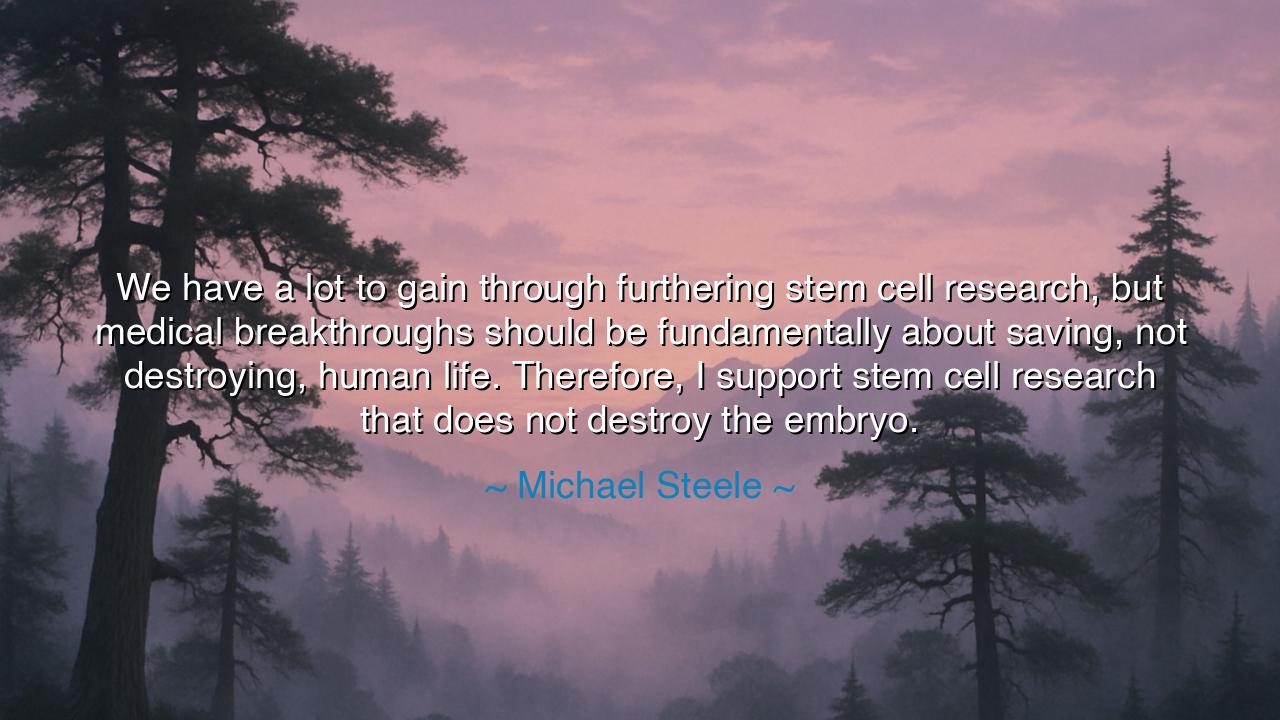
We have a lot to gain through furthering stem cell research, but
We have a lot to gain through furthering stem cell research, but medical breakthroughs should be fundamentally about saving, not destroying, human life. Therefore, I support stem cell research that does not destroy the embryo.






Hear, O seekers of wisdom and healing, the words of Michael Steele, who declared: “We have a lot to gain through furthering stem cell research, but medical breakthroughs should be fundamentally about saving, not destroying, human life. Therefore, I support stem cell research that does not destroy the embryo.” These words, heavy with both promise and caution, speak to the eternal balance between the hunger for progress and the sanctity of life itself. For in the pursuit of knowledge, humanity must never forget that the highest purpose of science is not conquest, but compassion.
The origin of this saying lies in the great debates of the early twenty-first century, when discoveries in stem cell research held forth the possibility of healing diseases long thought incurable. The potential was immense: damaged tissues could be renewed, the blind might see, the paralyzed might walk. And yet, this promise was entangled with a profound ethical dilemma: many of these cells were harvested through the destruction of embryos, the earliest form of human life. Steele’s words arose from this moment of tension, affirming that progress must never come at the price of forsaking the sacredness of life at its very beginning.
For what is the worth of a breakthrough if its foundation is built upon the destruction of the innocent? To save one life while extinguishing another is no true victory, but a hollow compromise. Steele reminds us that medical progress, if it is to be righteous and enduring, must be aligned with the deepest moral law: that life is sacred from its first flicker to its final breath. To protect the embryo is not to deny science, but to guide it onto a path of justice, to ensure that healing is not corrupted by harm.
History gives us lessons of this truth. In the age of Hippocrates, physicians swore the oath to “do no harm,” a vow that has guided medicine for centuries. When the Nazis twisted science toward cruelty, conducting horrific experiments upon the innocent in the name of progress, the world recoiled in horror and reaffirmed that true medicine must serve life, not destroy it. Thus Steele’s words are not bound to the debate of his time alone, but echo the ancient call: knowledge must be yoked to morality, or it becomes a beast that devours rather than heals.
Yet, let us not despise the hope within stem cell research. For science has found ways forward: from adult stem cells, from umbilical cords, from methods that preserve the embryo while still unlocking the mysteries of regeneration. These discoveries reveal that the union of ethics and innovation is not only possible, but fruitful. By refusing to sacrifice principle, humanity finds a nobler path, one that heals without blood, that restores without betrayal. Steele’s vision is thus both stern and hopeful: that progress need not be stained with destruction.
The lesson, O listeners, is clear: let your pursuit of knowledge be guided always by reverence for life. Do not fall into the temptation of believing that the end justifies the means. For every discovery born of destruction plants seeds of sorrow, while every discovery born of respect plants seeds of blessing. True greatness in science lies not in how far we advance, but in how faithfully we remember our duty to protect the vulnerable, even those too small for the world to see.
Therefore, let your actions be these: support research that heals without harm, innovations that honor both progress and principle. Encourage scientists to walk the harder, nobler path, and hold leaders accountable to uphold the sanctity of life. And in your own heart, cherish the truth that saving life is the highest calling of all human endeavor.
Thus let Steele’s words endure: “Medical breakthroughs should be fundamentally about saving, not destroying, human life.” This is not only a guideline for research but a compass for every choice. Walk by it, and your works will not merely change the world—they will preserve its very soul.






AAdministratorAdministrator
Welcome, honored guests. Please leave a comment, we will respond soon